UFC 291 Beforemath: Justin Gaethje and Dustin Poirier Poised for Violence
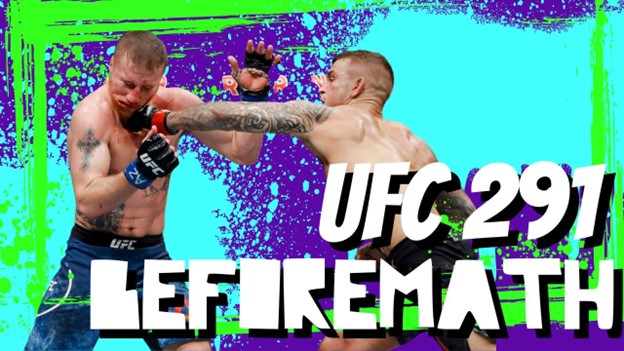
Blaine Henry/Sherdog.com illustration
You wake up drenched in sweat. “It was all a dream,” you say to yourself, “the BMF belt isn’t real.” Then you hear a laugh in the corner. From the darkest part of your room, UFC President Dana White laughs. “This weekend at UFC 291,” White says, “Dustin Poirier and Justin Gaethje fight for the BMF belt.” How can this be true? You thought it was a dream. It was not. The BMF belt is back. “If you don’t know, now you know,” White says as he leaves your room. He has more homes to invade. Today, we are back for the latest edition of Beforemath.
Gaethje: Must Control his Inner Lust for Violence
Gaethje thrives in a firefight. While he’s made great strides as a fighter, he’s not broken those old habits in the heat of the moment. There have been fights where he got into a brawl and looked bad, like against Michael Chandler and Charles Oliveira, and at other times he’s looked like a master tactician with a great jab and precise footwork. Every fight he takes, Poirier brings out just the type of brawl that gets fighters to second guess how they fight and start to hunt for the head. This makes for a volatile mix for Gaethje and can draw him into one of those slugfests where the two fighters take lumps out of each other.
Advertisement
Next, we have to slow Poirier down. Body work will be Gaethje’s best friend. He is good at blasting the midsection with his kicks, but with Poirier being a predominant southpaw, the lead hook to the body could be a great investment. For that, we look at the best in boxing at targeting a southpaw’s body: Ryan Garcia. When it comes to the lead hook to the body against the southpaw, the liver is the key to success. Southpaws have their right side forward, the same side the liver is on. With a good shot to the liver, a body can shut down. Pour on the shots to the liver and cardio will waste away to nothing and the liver can eventually give out.
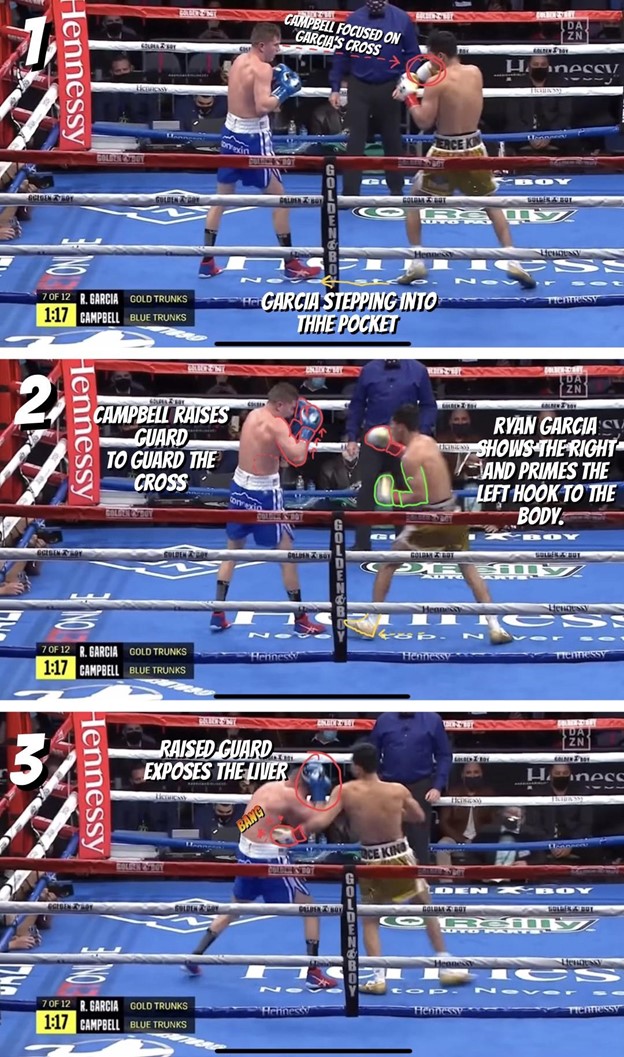
Blaine Henry/Sherdog.com illustration
Garcia is a master at attacking the body against a southpaw. In our first diagram, we see Garcia setting up Olympic silver medalist, Luke Campbell. (1) To set Campbell up and elevate his arms to a high guard position, by flashing the right cross. With Garcia’s speed, Campbell looks for a head start at blocking the shots. In Gaethje’s case, it will be the power that causes Poirier to want to get out front. Back to Garcia, as he steps in (2) Campbell has his guard high to block a cross that will never come. (3) With the perfect storm of the feinted right to the raised guard, the liver is perfectly exposed and Garcia lands to the body.
This shot put down Campbell and he wasn’t able to get back up. Setting up the liver shot in this way for Gaethje can be a major difference maker for him at UFC 291. With Poirier being so hard to put away, investing to the body early is a huge point of interest for Gaethje.
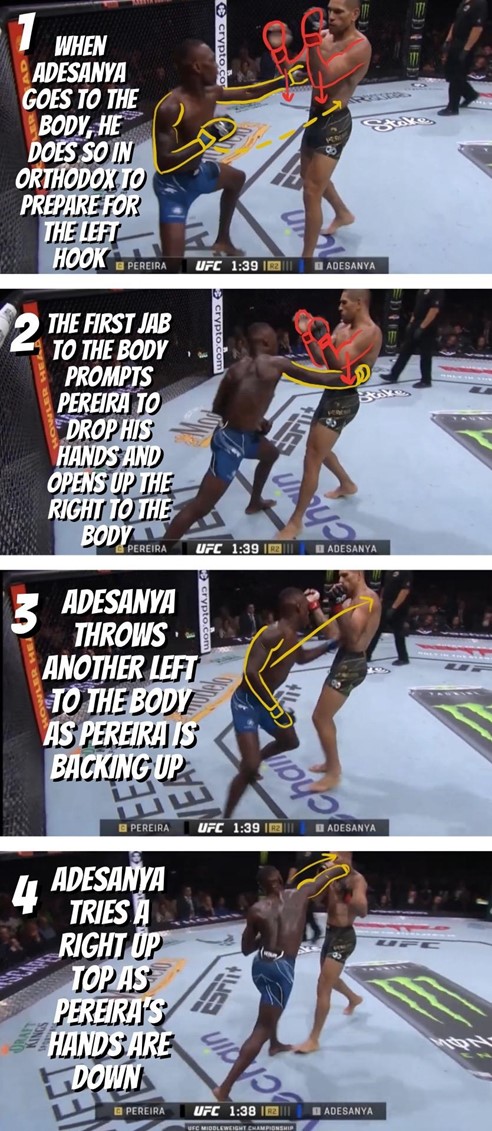
Blaine Henry/Sherdog.com illustration
Building off of this, working to the body will open up shots up top. Israel Adesanya is the example we will be using for this. Against Alex Pereira, (1) Adesanya would start by going to the body. To get the high guard down, (2) Adesanya would throw the cross to the body, (3) the lead to the body to set up the power shot next, and (4) would change levels and go up top. This may seem the opposite of what we talked about in the last section, but keeping the unpredictability in his striking will be his benefit.
Finally, we have the low kick. In their first fight in 2018, Gaethje had a lot of success by smashing the legs, but it was also his undoing. He went to that well too often and got countered. Off of all of his body work, setups, and striking, Justin Gaethje will want to tack these on at the end of combinations and not throw them as often naked.
Poirier: Anyone, Anytime, Anywhere
Poirier is a BAMF. He will fight anyone, anytime, anywhere. He’s essentially a modern-day Marvin Hagler. Fighting Gaethje again at this point, and as a non-title pay-per-view headliner, lends credence to how much faith the UFC has in Poirier and Gaethje. This fight with Gaethje represents a fight for the sake of violence. This fight will require Poirier to drag Gaethje straight to hell as he’s done against every single opponent not named Khabib Nurmagomedov or Charles Oliveira. Keys to this will be to get Gaethje to do the exact opposite of what we laid out in the Gaethje section. So just reverse all of that.For Poirier, punishing the naked leg kicks is priority numero uno. We saw in the first fight that Poirier used the counter cross to hit heavy. With a low kick being thrown, a hand is often dropped to counterbalance to keep a fighter from falling down. This allows for a lane to land the cross.
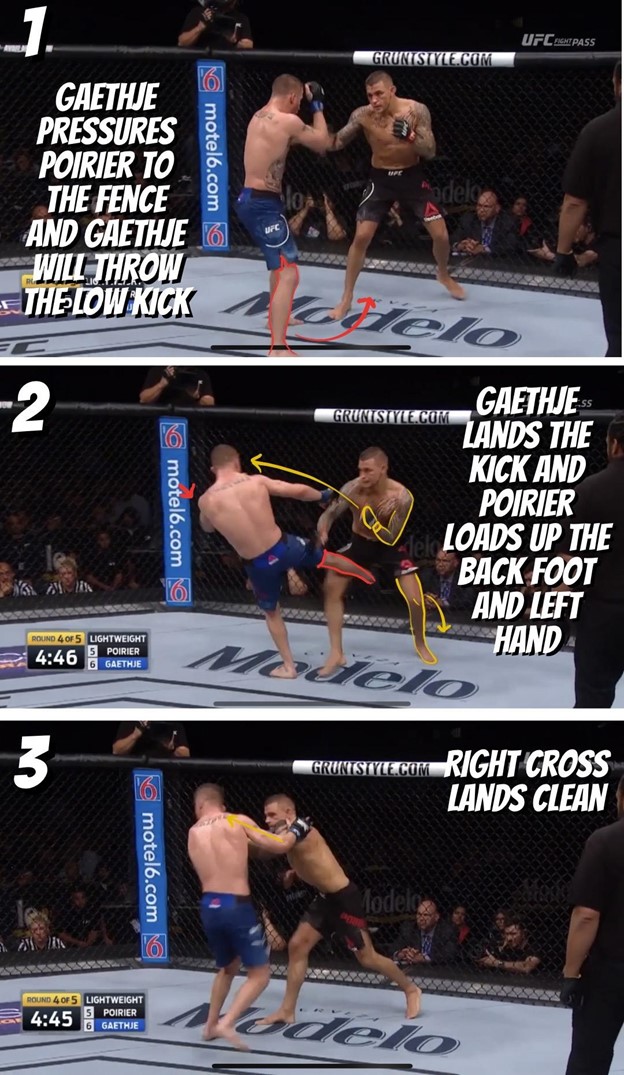
Blaine Henry/Sherdog.com illustration
Ending the first fight, Gaethje (1) pressed Poirier to the fence. Having gone to the naked low kick for the entire fight, Poirier would pick up on what was coming. (2) As Gaethje lands the kick, Poirier loads up on his back foot to push off for a right. He also drops his hand to load up the left cross as well. (3) He fires the cross right down the pipe and lands clean. This wobbled Gaethje and seconds later the fight was over.
Poirier needs to remind Gaethje of this as soon as possible and disincentivize him from throwing as many naked low kicks. It will help him keep his mobility and take away one of Gaethje’s best weapon or punish him every time he uses it.
Punishing Gaethje will not be enough. Poirier will also have to make sure to check these leg kicks and get him to miss, something we will touch on next. Poirier has done well to get better at checking kicks but hasn’t been perfect. This fight will require him to be the best kick checker he’s ever been. As for the hands, Poirier leads with his chin and can get caught a lot. But he’s perfectly happy to take one to land two. He did this with Gaethje and he will do it again. But in recent years, Poirier has gotten behind his shoulder and rolled with the punches a bit more.
The shoulder roll, animated above, allows a fighter to protect every part of their body while letting them keep their ability to counter and parry. The lead shoulder provides protection for the chin. That arm protects the liver that we discussed at the start of the article. The rear is tucked away under the elbow and the rear hand is by the chin. The pull counter cross, lead jab, and uppercut are all viable weapons for Poirier.
Lastly, Poirier needs to make Gaethje miss. Getting him to whiff at air is going to be the best way to wear out Gaethje without putting him in the way of damage. To do this, Poirier will want to feint and draw attacks out of Gaethje. Feinting with the hands is a sure-fire thing to work, but in MMA we have other weapons and other weapons to feint with. Feinting the low kick, after landing some of his own, will also open up big punches for Poirier while getting him to punch at air.
Poirier can also change levels to threaten the takedown to also get Gaethje to react.
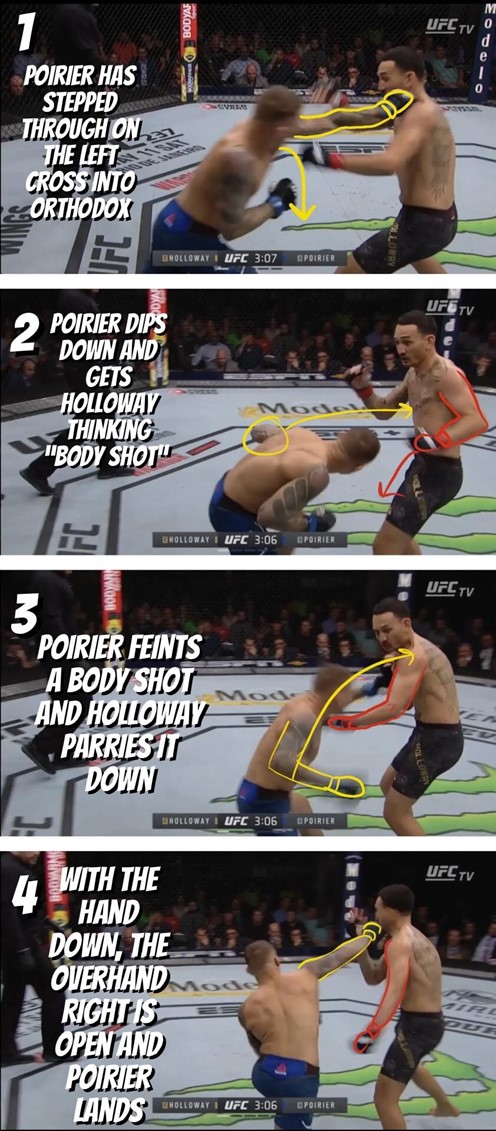
Blaine Henry/Sherdog.com illustration
Against Max Holloway, Poirier thrived with this. (1) He opened up the exchange above with a jab up top and would dip down to his right. (2) The dip, which loaded up the right hand, gets Holloway to lower his lead hand. Poirier (3) pops Holloway up top with a jab again and quickly (4) fires a right hook that snaps Holloway’s head sideways. Changing levels like this will be the key to Poirier’s success at UFC 291. Making Gaethje think about where he has to defend will keep him from being able to think about what to throw at Poirier. This alone will put Poirier in an advantageous position.
All in all, this fight at UFC 291 truly deserves the BMF designation. Both fighters have fought the best the division has to offer and always, always have mega-violence potential. Let’s crown a new champion this weekend!
More




 UFC News & Features
UFC News & Features


